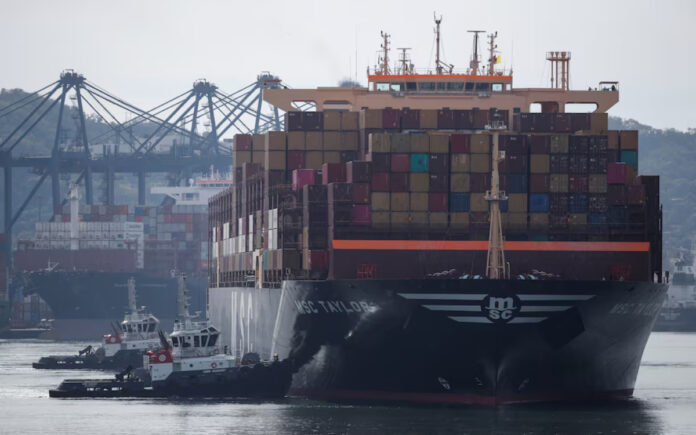Mexico City: U.S. President Donald Trump’s sweeping freeze on foreign aid has stalled a United Nations-backed initiative in Mexico aimed at preventing precursor chemicals for fentanyl from reaching drug cartels, according to multiple sources familiar with the matter. The move has disrupted several U.S.-funded counternarcotics operations in Mexico in recent weeks.
The initiative, which provided Mexico’s Navy with training and equipment to enhance cargo screening at the Port of Manzanillo, Mexico’s busiest container port, has been put on hold due to the funding halt. Plans to expand the program to the ports of Lázaro Cárdenas and Veracruz this month have also been suspended, sources said.
The effort was part of the Container Control Programme, a collaboration between the United Nations Office on Drugs and Crime (UNODC) and the World Customs Organization, designed to improve cargo inspections and curb cross-border smuggling. The U.S. initially provided $800,000 to launch the program at Manzanillo in 2023, according to sources.
Impact on Drug Trafficking at Mexican Ports
Manzanillo has long been a key hub for traffickers smuggling Chinese chemical precursors into Mexico to supply clandestine labs producing synthetic opioids and methamphetamine. Drug traffickers have also used outgoing cargo shipments to smuggle methamphetamine, particularly to European markets.
The funding freeze has halted future training and equipment donations at Manzanillo, including additional cargo scanners and drug-testing equipment, sources revealed.
When contacted by Reuters, White House Deputy Press Secretary Anna Kelly declined to comment on the administration’s decision to halt funding for the program but stated that Trump’s actions were focused on border security and reducing federal spending.
US President Donald Trump's aid freeze has disrupted an anti-narcotics program at Mexican ports, eight people familiar with the situation https://t.co/UpDolZ2VUa pic.twitter.com/pmWVyn59U6
— Reuters (@Reuters) February 24, 2025
Broader Freeze on U.S. Anti-Narcotics Efforts
The stalled U.N. cargo program is part of a broader pause on U.S.-funded anti-narcotics initiatives in Mexico following Trump’s January 20 foreign aid freeze. Other halted programs include:
- Training Mexican authorities to detect and dismantle clandestine fentanyl labs
- U.S. donations of drug-sniffing dogs to Mexican law enforcement
While the Trump administration has granted waivers to resume some security programs worldwide, only $7.8 million of the State Department’s Bureau of International Narcotics and Law Enforcement Affairs (INL) budget for Mexico has been reauthorized. That funding is designated for countering fentanyl production and cartel operations.
However, the remaining $50 million, much of which is dedicated to disrupting fentanyl supply chains, remains frozen. The U.N. Container Control Programme in Mexico has not received a waiver, sources confirmed. A State Department official noted that additional waivers were under review but did not specify which programs might be reinstated.
Experts Warn of Consequences for U.S. Drug Crisis
Enrique Roig, a former senior State Department official, warned that the funding freeze could undermine efforts to curb the fentanyl epidemic in the U.S., which has claimed over 450,000 American lives in the past decade.
“Stopping all these programs at this moment, I just don’t see how this is going to have a positive impact on reducing the numbers of fentanyl deaths in the U.S.,” Roig said.
A Reuters investigation previously exposed how Chinese precursor chemicals enter North America via air and sea before being converted into fentanyl in Mexican drug labs.
Trump’s Stance on Mexican Cartels and Military Action
The Trump administration has prioritized dismantling fentanyl supply networks and has recently designated Mexico’s Sinaloa and Jalisco New Generation cartels as foreign terrorist organizations.
Trump has also publicly advocated for a U.S. “military operation” against Mexican cartels. Following the cartel designation, Elon Musk, a close Trump adviser, tweeted:
“That means they’re eligible for drone strikes.”
While the terrorist designation does not legally authorize military action, analysts suggest it could serve as a political justification for potential U.S. intervention.
In response, Mexican President Claudia Sheinbaum announced plans to propose a constitutional reform aimed at reinforcing Mexico’s national sovereignty against external military threats.
Also Read | Trump to Ukraine: Seal the $500 Billion Deal or Risk Losing More
Mexican Ports Remain Key Smuggling Routes
The U.S. investment in Manzanillo’s security infrastructure has had an impact, with Mexican authorities intercepting nearly 90 tons of meth ingredients in July 2024 and another 25 tons in December. However, smuggling remains a persistent challenge, with traffickers adapting their methods.
Other ports, such as Veracruz on the Gulf of Mexico, were set to receive enhanced cargo inspections under the U.N. expansion plan, as traffickers increasingly route Chinese fentanyl precursors through Europe before smuggling them across the Atlantic into Mexico.
The expansion to Veracruz and Lázaro Cárdenas was expected to cost between $1.5 million and $2 million, but remains stalled.
Additionally, talks were underway to launch a U.N. program at Mexico City’s Benito Juárez International Airport (AIRCOP), a key hub for air-smuggled fentanyl precursors. The U.S. funding freeze could jeopardize this initiative as well.
The United Nations Office on Drugs and Crime (UNODC), Mexico’s presidency, and its foreign ministry declined to comment on the situation.
Conclusion
Trump’s foreign aid freeze has disrupted a critical U.N. anti-narcotics initiative in Mexico, threatening ongoing efforts to curb fentanyl smuggling and synthetic drug production. With bilateral security cooperation strained and concerns over potential U.S. intervention, Mexico’s response to the funding cuts could shape the future of counter-narcotics efforts in the region.



